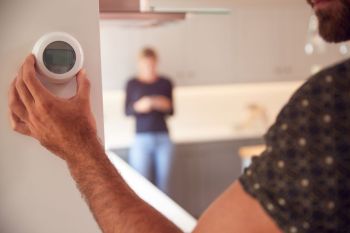Everyone knows that cars contribute to air pollution, but most people might not know that the way someone drives directly affects how much fuel their car needs.
How can you save money and gas while driving?
The U.S. Department of Energy advises on how to drive more efficiently with tips that include driving more conservatively, combining trips, and reducing vehicle loads.
According to the Office of Energy Efficiency and Renewable Energy (EERE), lighter vehicles use $0.30 more per gallon for every 5 mph over 50 mph.
Fueleconomy.gov reported that speeding, rapid acceleration, and braking can lower your gas mileage by roughly 15% to 30% at highway speeds and 10% to 40% in stop-and-go traffic.
Vehicles use the most gas when accelerating, so using the cruise control feature is a great way to maintain a constant speed and alleviate the strain for gas.
Combining trips can save time, money, and fuel. This is especially an issue in colder climates. Shorter trips can use twice as much fuel as one long, multipurpose trip that covers the same distance when the engine is warm and at its most fuel-efficient temperature.
Lastly, keep your car load light. An extra 100 pounds in your trunk could reduce your fuel economy by about 1%.
Why is using less gas important?
Many people forget that saving the planet is also saving themselves. Often called the "silent killer," air pollution is one of the biggest health emergencies, with a risk factor almost as high as tobacco, according to the WHO. Air pollution contributes to higher risks of respiratory infections, heart disease, asthma, and cancer.
The WHO states that the majority of the global population is breathing air that breaches their guidelines, with air pollution responsible for 6.7 million premature deaths annually. That being said, any measure taken to decrease air pollution increases everyone's chance of survival.
Gas-powered transportation is a major contributor to the overheating of our planet, accounting for almost 30% of all earth-warming air pollution in the U.S. annually.
A report by the U.N. found that phasing out dirty energy for clean energy sources such as wind and solar is essential to healing our planet.
According to new analysis from researchers at Virginia Tech and Rutgers University, the U.S. has one of the lowest walking rates in the world, with only 12% of all trips taken being walked. It's even worse when you factor in that 30% of all trips taken in the U.S. are under 1.6 miles, as Big Think reported.
Switching to public transportation and taking walks when possible instead of using gas-powered vehicles are other low-effort ways to help the issue of air pollution. If you're in the market for a new car, think about upgrading to an electric vehicle.
"Climate change and air quality cannot be treated separately. They go hand-in-hand and must be tackled together," said World Meteorological Organization Secretary-General Petteri Taalas, as reported by Reuters.
Join our free newsletter for easy tips to save more, waste less, and help yourself while helping the planet.








